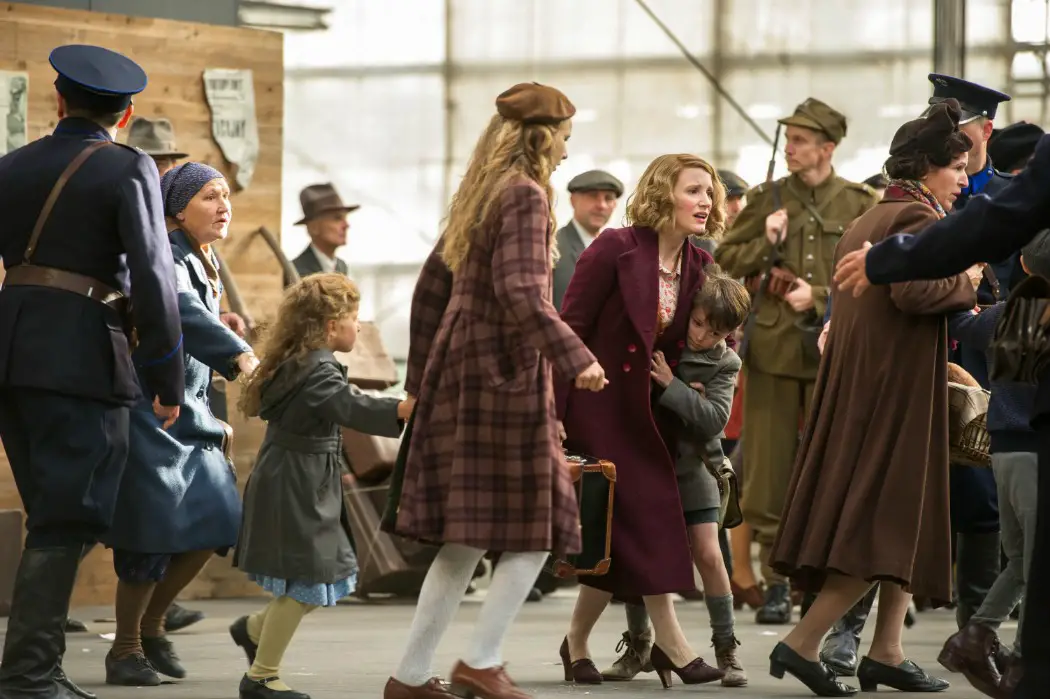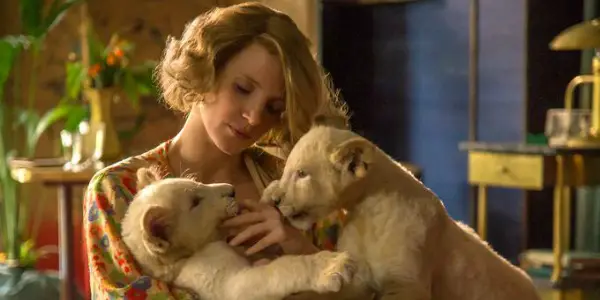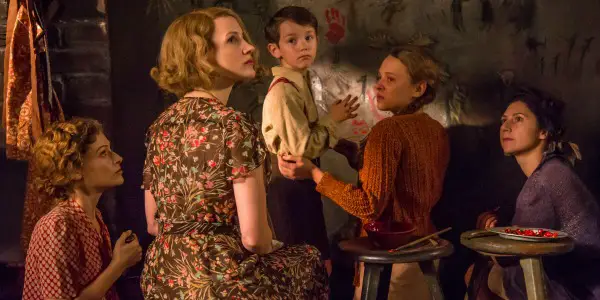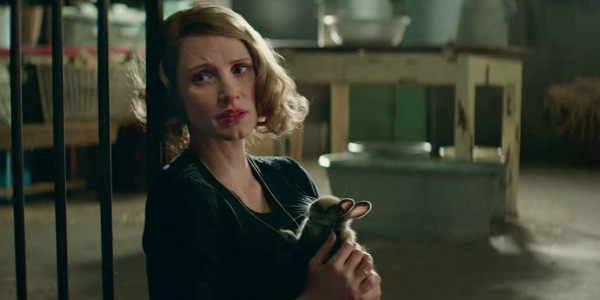THE ZOOKEEPER’S WIFE: The Holocaust Under A Softer Light

I love film, more than people probably, and I will…
Based on Diane Ackerman’s book, The Zookeeper’s Wife: A War Story, The Zookeeper’s Wife tells the real life story of Warsaw zoo’s director Jan Zabinski and his wife Antonina. The couple ran the zoo before, during and after WWII and during this time they saved 300 Jews from the Warsaw ghetto. Using Jan’s position as superintendent of the city parks they were able to smuggle people into the zoo (not open to the public, but subject to a German patrol) and hide them before arranging for safe houses elsewhere, some even stayed on in their private house for a number of years.
It goes without saying that the story of Jan and Antonina Zabinski is an extraordinary one. Not only because of their great feat of courage, but because they did all this while still managing the small number of animals that had survived the 1939 attack on Warsaw. It is to this film’s credit that it has kept true to the original story and done its best to convey the rather unusual, but heroic, story of the Zabinskis. However, as well made as it is, and how intriguing, you can’t help but feel this is a soft look at the holocaust. One too light and accessible to ever make an important point.
Of Elephants & Women
The Zookeeper’s Wife is a sweet film, I’ll say that about it. There is something indeniably lovely about Jessica Chastain, in general, and the way she dotes on the animals in her role here makes her that much more engaging. Though at times I feel like her accent might not be right, and she does seem just too sweet and innocent at times. I also would have liked a little more emotion from Chastain. Antonina clearly had a past, involving the Russian Revolution, but without scriptwriter Angela Workman and director Niki Caro allowing for these key moments, the depth to Antonina is kind of lost.

It goes without saying that in a film about the Warsaw zoo, during WWII, a lot of animals are going to die early on. Sorry about that, but they do. I have to say I have great admiration for the way Caro took on what is essentially a war film along with a menagerie of animals and their handlers. It was well worth it because when those bombs drop you feel the vulnerability of the animals and the Zabinski family. In fact, the animals as a whole, bring a sensitivity to the piece. Unfortunately you do end up worrying more about the animals than the Jews.
In fact, such an impression do Chastain and the animals make (an opening scene with an elephant emphasises this) they become the overriding theme of this film. Which is a shame, because it kind of makes you forget about the atrocity of the war raging outside. You see the holocaust from this nice, remote safe haven- which, come to think of it, perhaps Antonina did.
You’re never scared that any of the people hidden will be discovered, or that anyone will even be hurt, you don’t even know their names. So much is the distance from the Jewish characters that when Jan discovers Urszula (a young girl, only moments after she has been raped by two Nazi soldiers) you are shocked, but then immediately comforted knowing she’ll be safe with Antonina.
This all being said there is something to be said for this softer approach to what is essentially a story about the holocaust. Firstly, it encourages you to see the holocaust from a different point of view. One where the beliefs and kindness of people saved 300 lives. Secondly, it shows us the importance of true human comfort and sacrifice. But most importantly it frames the holocaust in a way that makes it palatable for those who are scared of the subject matter.

Additionally, I for one was very impressed in how Workman and Caro included the instance of Urszula’s rape. Played perfectly by Shira Haas, Urszula’s story is conveyed with great sympathy and without being exploitative. The poor girl essentially shuts down, traumatised, and soft as this film is in this respect at least it reaches out and sympathises. The sexual assault of Jewish women and girls by Germans and Nazi soldiers was prevalent in the streets, the ghettos and in the camps. Yet this is the only one of a few times I’ve seen it mentioned on film, and that is something to be admired.
Misdirection
As previously mentioned, you’re never really scared about anyone being found out, or even killed, in The Zookeeper’s Wife. That’s even with many threatening scenes. There’s a part of you that is scared for Urszula when she disappears down an alley, but part of you knows Jan will save her. You are ill at ease when Heck (a Nazi officer and zoologist, played by Daniel Bruhl) touches Antonina, but you know nothing bad is going to happen. Likewise, you’re pretty sure no one will ever find the Jewish people hidden in the zoo.
There’s two reasons why there is never any sense of fear and sadness in this film. The first is because, as mentioned above, the whole film has a softness to it. The second, I believe, is an issue with the direction. I really like Niki Caro, and was a great fan of her 2002 feature Whale Rider, but there seems to be something missing in this film. First and foremost the atmosphere is too even, there are really no ups and downs, it just all feels kind of nice and straight forward. There is also a complete lack of tension, which is most notable in scenes between Antonina and Heck.

Daniel Bruhl is something of a master at playing the ‘creepy German’, and while it’s kind of obvious that’s this is his role here, he plays it well. However, in scenes between Heck and Antonina there isn’t the tension you’d expect from this kind of scenario; the common ‘scary Nazi is attracted to heroic Jewish sympathiser’.
Not only are you never really scared for Antonina (excepting their final confrontation), but you kind of wonder at times whether she might actually actually like him. There is a note toward the end that she has ‘hid her disgust from him well’. However, it was clearly too well, because at times I for one thought she could be a little attracted to him.
Elsewhere in the film a similar lack of tension makes the narrative suffer. You never really believe anything bad will happen, Antonina is protected somehow from all of this and you are sure she and the people she protects will continue on quite happily. Antonina may well have sat at home of an evening, playing her piano, hiding her fear and disgust to protect her family and her ‘guests’. However, Chastain and Caro play this down to such a point that you really do end up thinking Antonina had very few worries, which of course couldn’t have been the case.
Conclusion
While I don’t think The Zookeeper’s Wife possessed the atmosphere and darkness I believe a film like this should, it still has a lot going for it. After all it is an extraordinary story, predictable, yes, but one that really happened. Workman and Caro have done their best to bring the Zabinskis story to light, and include previously unseen perspectives on WWII and the holocaust.
The performances are also quite good and the production is to be admired. I’m not sure I would say it was a very good take on the holocaust, I would say it’s a good film about a kind woman who likes animals. Still, it is a story worth telling, and while it’s not faultless, I believe it’s a story Workman, Caro and Chastain have told well.
Have you seen The Zookeeper’s Wife? How did you feel about it?
The Zookeeper’s Wife is out in cinemas across the US & UK. For release dates in your country check here.
Does content like this matter to you?
Become a Member and support film journalism. Unlock access to all of Film Inquiry`s great articles. Join a community of like-minded readers who are passionate about cinema - get access to our private members Network, give back to independent filmmakers, and more.
I love film, more than people probably, and I will watch pretty much anything. Seriously, anything! I have a postgraduate education in film & have spent an exceptionally long time trying to get inside the film industry. I'm a big believer in treating every film the same, and bringing something new to the film theory table, giving reasons for every argument made. You'll find that I'm an empathetic and fun sort of reviewer, at least, I like to think so. If I'm not watching films I'm doing exceptionally nerdy stuff, like watching documentaries about the history of medicine and collecting photos of old post boxes.












